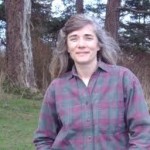I was talking earlier about my increasing sense of the sacred nature—I’ll call it that—of this work I’m part of, the work of the imagination, fiction and poetry. My friend Ann Pancake has a splendid essay in the latest issue of The Georgia Review on this very subject. Ann is talking about her choice to fictionalize the awful destruction of land and culture caused by mountaintop mining in her home state of West Virginia (and elsewhere). Documentation would have been one response. But what if you get down inside, if you imagine what it’s like?
Literature, she says, both the reading and the writing of it, reunites our conscious and unconscious mind. This, she says, is imperative. Our culture has elevated the conscious to the “complete neglect, if not outright derision” of the unconscious. This is disastrous not only because such psychic amputation cripples people, contributing to feelings of emptiness, insatiability, depression, and anxiety, but also because within that castoff unconscious—in intuition, in dreams—dwell ideas, solutions, and utterly fresh ways of perceiving and understanding.”
“I know my unconscious is eons ahead of my intellect,” she says, “worlds larger in vision than my rational mind.”
Artists, she says, are translators between the visible and invisible worlds, intermediaries between the profane and the sacred. Only by desacralizing the world, over centuries, have we given ourselves permission to destroy it.
●
Commercial break! LAUNCH PARTY! No Need of Sympathy to be launched at Brilliant Books, (www.brilliant-books.net/) Front Street, Traverse City, this Saturday, Oct. 12, at 7:00!
●
I’m thinking the intellect is like a sailboat. It wants to move from point A to point B. It calculates the wind direction and reefs or lets out its sails accordingly. It feels pretty proud of itself, getting from point A to point B. But it is entirely beholden to the water and the wind, what I’ll call the unconscious mind. The two minds together do the work. Neither can feel too arrogant.
That analogy is all wrong. Both minds are one mind, and the idea of “mind” is itself just a way of talking. What IS the mind? Where are these “parts” of it?
If you subscribed to this blog while I was in the middle of cancer treatment, if you’ve had cancer or have a dear one with cancer, you may be thinking, whoa, is she going to abandon that subject now? When one’s had Stage III cancer, the subject is never abandoned. It becomes part of the point of view, henceforth. H2O + cancer is the water I sail in.
Everything is the water we swim in--this gorgeous fall day, the impending disaster in this country brought to us by not seeing how connected we all are. Etcetera.
 I don’t mean to say that the “point” of writing poems or fiction is to make us feel empathy. It’s not to make us do anything. Ann Pancake’s novel, Strange as This Weather Has Been, is not a polemic, not even a gentle sermon. We take its characters and their lives into us. We never get rid of our new awareness that these people are like us, are us.
I don’t mean to say that the “point” of writing poems or fiction is to make us feel empathy. It’s not to make us do anything. Ann Pancake’s novel, Strange as This Weather Has Been, is not a polemic, not even a gentle sermon. We take its characters and their lives into us. We never get rid of our new awareness that these people are like us, are us.
One of the interesting things about (good, rich) poetry is the way it requires our full participation. There are gaps that can’t be filled by explication or paraphrase. We know that when we read it. We’re both exhilarated and frustrated. We can neither agree nor disagree with the poem. We step into a space where the intellect loses its bearings. We move into it not knowing, but knowing, in some way, where we are.
Cancer moves into my poems, and maybe into this blog, many times not visible, not paraphrasable, but felt.
What else? I did too much, it seems, the last week at the lake. Showing off to myself, or to you, probably. I now have what appears to be sciatica. My left hip hurts! I checked with my oncologist’s nurse to see if she thought chemo played any part in this. She said no. I'm headed now to PT.
And what else? I have an essay, "Bill's Clay Figures" in the Georgia Review which is also about how we make connections and try to make meaning out of them. I was asked to write a backstory on it, how it got written, etc. It's interesting and includes pictures and video link. You can read that at http://garev.uga.edu/blog.backstories.html
●
Repeat! The launch party for my new book, No Need of Sympathy, is this Saturday, Oct. 12, at Brilliant Books on Front Street in Traverse City. 7:00. I’d love it if you could come. There’ll be wine and cheese, Jim Crockett is going to play and sing, and I’m going to read poems from the book.
